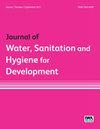Lessons learned from a Tiger Worm Toilet implementation project in Sierra Leone
IF 1.4
4区 环境科学与生态学
Q3 WATER RESOURCES
Journal of Water Sanitation and Hygiene for Development
Pub Date : 2023-07-29
DOI:10.2166/washdev.2023.134
引用次数: 1
Abstract
This paper discusses the implementation of Tiger Worm Toilets (TWTs) as a sustainable alternative to pit latrines in areas with challenging environmental conditions. The study was carried out in Koinadugu, Sierra Leone, where TWTs were installed in 200 households, providing safe sanitation for approximately 1,200 individuals within a 17-month period. The study reveals that TWTs offer several benefits over traditional pit latrines, including higher cost efficiency. Despite some setbacks, TWTs have been well-received by the local communities, resulting in a significant reduction in open defaecation in areas where latrines are not viable. The study presents areas of further research and concludes with recommendations for future TWT designs based on the lessons learned.从塞拉利昂虎虫厕所实施项目中吸取的经验教训
本文讨论了在具有挑战性环境条件的地区实施虎虫厕所(TWTs)作为坑式厕所的可持续替代方案。这项研究是在塞拉利昂的Koinadugu进行的,在那里200个家庭安装了twt,在17个月的时间内为大约1200人提供了安全的卫生设施。研究表明,与传统的坑式厕所相比,行波管有几个好处,包括更高的成本效率。尽管有一些挫折,西隧仍受到当地社区的欢迎,在没有厕所的地区,露天排便的情况大大减少。该研究提出了进一步研究的领域,并根据经验教训对未来行波管的设计提出了建议。
本文章由计算机程序翻译,如有差异,请以英文原文为准。
求助全文
约1分钟内获得全文
求助全文
来源期刊

Journal of Water Sanitation and Hygiene for Development
WATER RESOURCES-
CiteScore
3.10
自引率
11.80%
发文量
58
审稿时长
16 weeks
期刊介绍:
The Journal of Water, Sanitation and Hygiene for Development is a peer-reviewed journal devoted to the dissemination of high-quality information on the science, policy and practice of drinking-water supply, sanitation and hygiene at local, national and international levels.
 求助内容:
求助内容: 应助结果提醒方式:
应助结果提醒方式:


